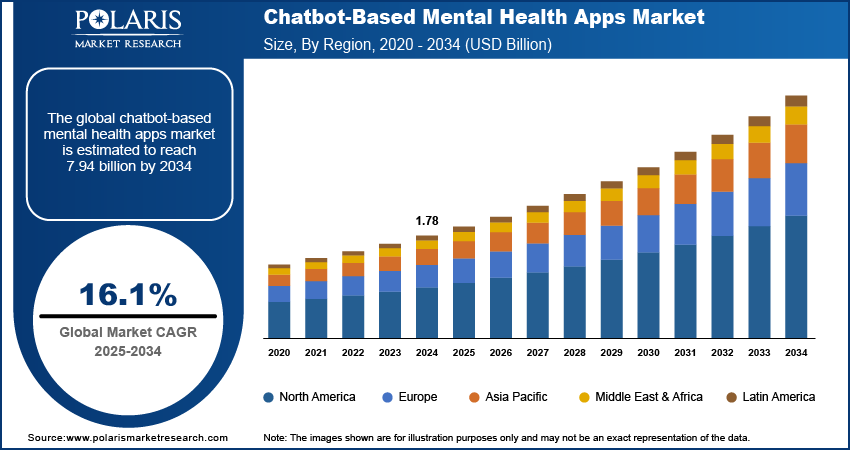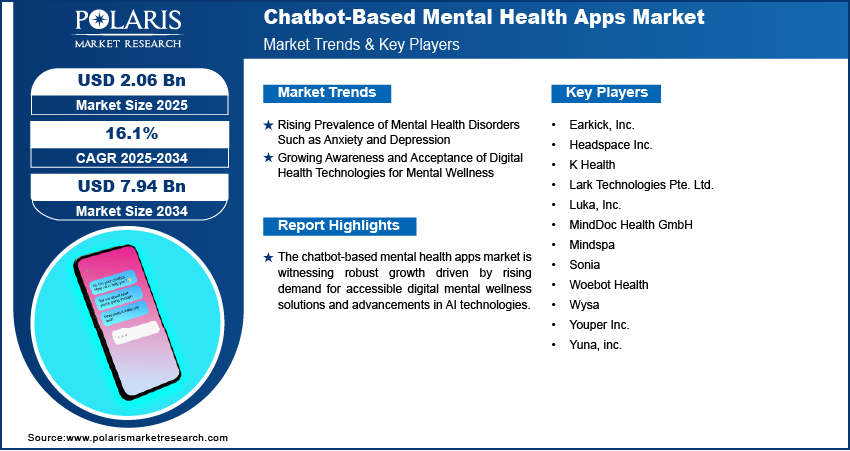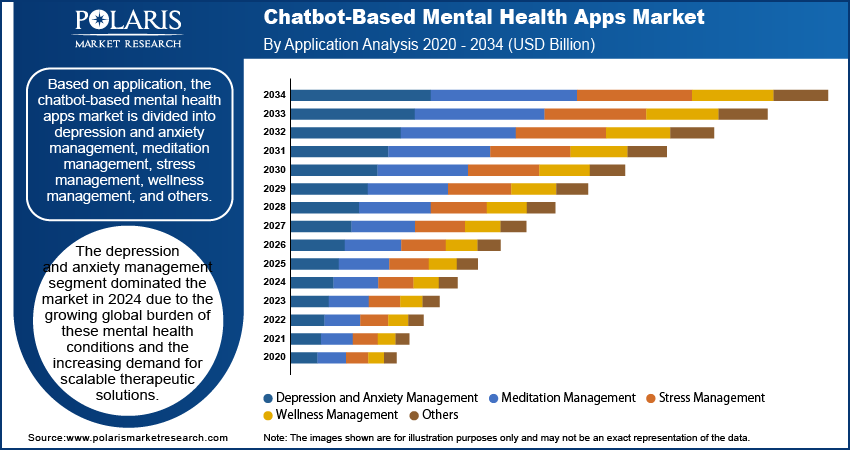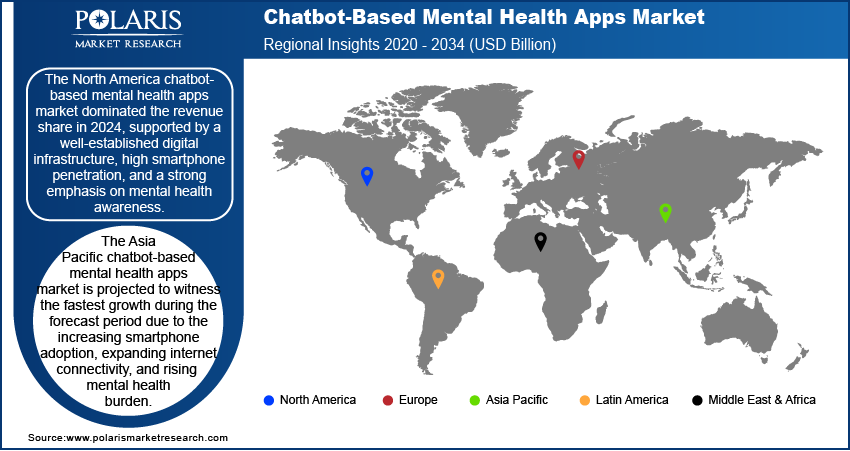
Chatbot-Based Mental Health Apps Market Size, Share, & Industry Analysis Report
By Device (Smartphone and Tablets), By Application, By Technology, By Platform, By Region – Market Forecast, 2025–2034
- Published Date:Jun-2025
- Pages: 129
- Format: PDF
- Report ID: PM5782
- Base Year: 2024
- Historical Data: 2020-2023
Market Overview
The global chatbot-based mental health apps market size was valued at USD 1.78 billion in 2024, growing at a CAGR of 16.1% during 2025–2034. The growth is driven by the shift from conventional care to personalized, patient-focused digital approaches.
Chatbot-based mental health apps are AI-powered digital tools designed to act in human-like conversations and provide mental health support, such as stress management, emotional guidance, and cognitive behavioral techniques. These platforms have gained importance due to the rising need for accessible, convenient, and continuous mental health services. These apps address critical care gaps by offering 24/7 availability, particularly in underserved regions or for individuals hesitant to seek traditional therapy, as mental health challenges become more prevalent globally. According to a June 2022 report by United GMH, approximately 1 billion people worldwide have a mental health condition. Thus, the ability to receive immediate, anonymous, and personalized responses makes chatbot-based mental health apps an increasingly preferred solution, especially for users seeking on-demand emotional support without the constraints of scheduled appointments.

To Understand More About this Research: Request a Free Sample Report
The increase in funding and investments in AI-driven mental health innovations has fueled the growth of chatbot-based mental health apps. Venture capital firms and healthcare investors are backing start-ups and tech companies developing these AI-integrated platforms with the expanding acceptance of digital therapeutics and the growing interest in scalable mental health care delivery. For instance, in May 2023, Videra Health secured USD 5.6 million in Seed II funding led by Peterson Ventures to expand its AI-driven mental health screening platform. The technology analyzes video-based behavioral cues to improve scalable mental health monitoring and care accessibility. These investments are accelerating advancements in natural language processing, emotional AI, and personalized interventions, thereby improving user experience and therapeutic efficacy. As a result, the sector is witnessing a rapid evolution in app refinement and reach, driving further adoption across diverse demographic groups and mental health conditions management.
Industry Dynamics
Rising Prevalence of Mental Health Disorders Such as Anxiety and Depression
The rising prevalence of mental health disorders such as anxiety and depression is boosting the growth opportunities. According to a March 2023 report from WHO, depression affected 3.8% of the global population, including 5% of adults (4% men, 6% women) and 5.7% of adults over 60. There is an increasing demand for accessible, scalable, and cost-effective solutions as these conditions continue to affect a growing segment of the global population. Chatbot-based mental health apps offer immediate support, personalized coping strategies, and early intervention capabilities, making them especially valuable for individuals experiencing mild to moderate symptoms. These digital tools help bridge the gap between growing mental health needs and the limited availability of traditional care services, particularly in regions facing shortages of mental health professionals. Their ability to provide anonymous, non-judgmental interaction also promotes users who might otherwise avoid seeking help.
Growing Awareness and Acceptance of Digital Health Technologies for Mental Wellness
Growing awareness and acceptance of digital health technologies have contributed to the adoption of chatbot-based mental wellness solutions. In October 2022, the Ministry of Health and Family Welfare launched India's National Tele Mental Health Programme (Tele MANAS), which has handled over 1.81 million calls by February 2025. The free 24/7 helpline, available in 20 languages, operates through 53 regional cells to expand mental healthcare access. They are increasingly open to integrating technology into their mental wellness routines as consumers become more informed about the benefits of telehealth and digital therapy. The normalization of app-based interventions, combined with the widespread use of smartphones, has created a favorable environment for the growth of AI-driven mental health teletherapy platform solution. Moreover, endorsements from healthcare providers and inclusion in wellness programs have further improved their credibility. This shift in perception reflects a broader transformation in how mental health care is accessed and delivered, positioning chatbot-based apps as a mainstream tool in mental wellness management.

Segmental Insights
By Application Analysis
The segmentation, based on application, includes depression and anxiety management, meditation management, stress management, wellness management, and others. The depression and anxiety management segment dominated the market in 2024 due to the growing global burden of these mental health conditions and the increasing demand for scalable therapeutic solutions. These apps offer accessible, round-the-clock support, allowing users to manage symptoms effectively without the need for immediate in-person intervention. Chatbot-based platforms are well-suited to address the unique needs of individuals experiencing depression and anxiety with features such as mood tracking, cognitive behavioral techniques, and personalized coping strategies. Their user-friendly design and anonymity also provide comfort, encouraging greater adoption across various age groups and demographics.
By Technology Analysis
The segmentation, based on technology, includes machine learning and deep learning, natural language processing, and others. The natural language processing segment is expected to witness substantial growth during the forecast period due to its role in authorizing more human-like and emotionally intelligent conversations. NLP technology allows chatbots to understand, interpret, and respond to user inputs with greater context and empathy, especially improving the quality of interaction. Advancements in NLP are driving app sophistication and enhancing therapeutic outcomes as user expectations shift toward more personalized and engaging digital experiences. Continuous improvements in language models and sentiment analysis are further contributing to the effectiveness of mental health chatbots, driving the demand for NLP-based applications.
By Platform Analysis
The segmentation, based on platform, includes Android, iOS, and others. The Android segment is expected to witness the fastest growth during the forecast period primarily driven by the widespread global use of Android-based smartphones. The affordability and accessibility of Android devices in emerging and developing economies have expanded the user base for mental health apps. App developers are increasingly prioritizing Android platforms to maximize reach, particularly in regions where digital mental health services are in high demand, but clinical infrastructure remains limited. Additionally, open-source development flexibility and a broader device ecosystem make Android an attractive choice for deploying and scaling chatbot-based mental wellness applications.
By Device Analysis
The segmentation, based on device, includes smartphones and tablets. The tablets segment is expected to witness a higher CAGR during the forecast period owing to the increasing preference for devices with larger screens in therapeutic and guided wellness applications. Tablets provide an improved user experience for mindfulness exercises, interactive assessments, and longer conversational sessions, which are crucial in mental health management. They are increasingly being integrated into educational and workplace wellness programs, broadening their adoption beyond individual users. Furthermore, their usability in both clinical and nonclinical settings supports their growth in institutional mental health initiatives.

Regional Analysis
The report provides market insights into North America, Europe, Asia Pacific, Latin America, and the Middle East & Africa. The North America chatbot-based mental health apps market dominated the revenue share in 2024, supported by a well-established digital infrastructure, high smartphone penetration, and a strong emphasis on mental health awareness. In October 2023, the CDC launched a Mental Health Strategy that promotes well-being through data-driven approaches, prevention, and partnerships. It focuses on surveillance, reducing stigma, strengthening support systems, and improving access to mental health services across communities. The region benefits from the early adoption of AI technologies and favorable reimbursement policies in digital therapeutics, accelerating the integration of chatbot apps in healthcare systems. Additionally, increasing demand for remote care, rising mental health concerns, and robust investments in digital health startups have reinforced North America's market leadership.
The US chatbot-based mental health apps market held the largest share in North America, due to the high demand for innovative mental health solutions driven by increasing awareness and acceptance of digital therapeutics. The country benefits from a mature digital health ecosystem, widespread access to smartphones, and a strong presence of AI and health-tech innovators. Additionally, growing mental health challenges and the need for timely interventions have accelerated the integration of chatbot-based platforms into mainstream wellness and care services.

The Asia Pacific chatbot-based mental health apps market is projected to witness the fastest growth during the forecast period, due to the increasing smartphone adoption, expanding internet connectivity, and rising mental health burden. According to a February 2025 report by India’s Ministry of Health and Family Welfare, WHO stated that mental health conditions account for 2,443 disability-adjusted life years (DALYs) per 10,000 population in India. The region is witnessing a cultural shift toward greater mental health awareness, driven by governmental initiatives and growing youth engagement with digital platforms. Chatbot-based apps are particularly appealing in this region due to their affordability and ability to overcome mental health stigma. The rise in mobile health innovations and tech-driven wellness solutions positions Asia Pacific as a major growth region for chatbot-based mental health apps.
The China chatbot-based mental health apps sector is witnessing growth due to the rapid digital transformation of healthcare services and rising public awareness of mental wellness. Increasing smartphone use and internet connectivity have made digital solutions more accessible to the population, particularly in urban areas. Moreover, growing cultural positive attitudes toward mental health and the government’s support for artificial intelligence in mental health are boosting favorable conditions for app-based mental health tools.
The Europe chatbot-based mental health apps market is projected to witness substantial growth during the forecast period, driven by a strong regulatory framework supporting digital health adoption and increasing public investments in mental wellness initiatives. The region's focus on improving accessibility to mental health services, especially through digital transformation in healthcare, is fueling the adoption of chatbot-based platforms. High levels of mental health literacy, coupled with the integration of AI in healthcare policies and research funding, are further strengthening Europe’s market position. The focus on preventive care and personalized wellness experiences also aligns with the offerings of chatbot-based mental health solutions.
The UK chatbot-based mental health apps market growth is driven by a strong push toward digital mental health initiatives and an increasing focus on improving access to psychological support. The National Health Service (NHS) and private sectors are promoting digital innovation to reduce the burden on traditional therapy systems. Public openness to using AI-enabled tools for wellness, along with a high level of trust in regulated digital health solutions, supports the sustained adoption of chatbot-based mental health platforms across the country.
Key Players and Competitive Analysis
The chatbot-based mental health apps industry is witnessing rapid growth, driven by revenue opportunities from increasing demand for digital mental health solutions. Major players are leveraging competitive intelligence and strategy to differentiate their offerings in developed markets while exploring emerging market segments. Technological advancements in AI, such as natural language processing and machine learning, are improving user engagement and personalization. Revenue growth analysis indicates strong potential, particularly in stress and anxiety management applications.
Leading apps are adopting development strategies, such as partnerships with healthcare providers and strategic investments in AI-driven features. Disruptions and trends, such as the integration of wellness management tools, are reshaping the competitive landscape. Growth projections highlight the untapped potential of in-home care and telehealth integration. Meanwhile, economic and geopolitical shifts influence regional adoption rates. Companies must focus on sustainable value chains, user-centric innovation, and expansion opportunities in high-demand regions to sustain competitive positioning.
A few key players are Earkick, Inc.; Headspace Inc.; K Health; Lark Technologies Pte. Ltd.; Luka, Inc.; MindDoc Health GmbH; Mindspa; Sonia; Woebot Health; Wysa; Youper Inc.; and Yuna, Inc.
Key Players
- Earkick, Inc.
- Headspace Inc.
- K Health
- Lark Technologies Pte. Ltd.
- Luka, Inc.
- MindDoc Health GmbH
- Mindspa
- Sonia
- Woebot Health
- Wysa
- Youper Inc.
- Yuna, inc.
Industry Developments
March 2024: Slingshot AI launched as an AI mental health research lab focused on developing the first foundational psychology model. It collaborates with global mental health providers to enhance accessible and effective support worldwide.
September 2024: Magellan Health, Inc. launched a Teen Mental Wellbeing app for ages 13–22, leveraging BeMe Health’s digital platform. It offers science-backed tools to foster resilience and emotional well-being through evidence-based methods.
Chatbot-Based Mental Health Apps Market Segmentation
By Application Outlook (Revenue, USD Billion, 2020–2034)
- Depression and Anxiety Management
- Meditation Management
- Stress Management
- Wellness Management
- Others
By Technology Outlook (Revenue, USD Billion, 2020–2034)
- Machine learning and Deep learning
- Natural Language Processing
- Others
By Device Outlook (Revenue, USD Billion, 2020–2034)
- Smartphone
- Tablets
By Platform Outlook (Revenue, USD Billion, 2020–2034)
- Android
- iOS
- Others
By Regional Outlook (Revenue, USD Billion, 2020–2034)
- North America
- US
- Canada
- Europe
- Germany
- France
- UK
- Italy
- Spain
- Netherlands
- Russia
- Rest of Europe
- Asia Pacific
- China
- Japan
- India
- Malaysia
- South Korea
- Indonesia
- Australia
- Vietnam
- Rest of Asia Pacific
- Middle East & Africa
- Saudi Arabia
- UAE
- Israel
- South Africa
- Rest of Middle East & Africa
- Latin America
- Mexico
- Brazil
- Argentina
- Rest of Latin America
Chatbot-Based Mental Health Apps Market Report Scope
|
Report Attributes |
Details |
|
Market Size in 2024 |
USD 1.78 billion |
|
Market Size in 2025 |
USD 2.06 billion |
|
Revenue Forecast by 2034 |
USD 7.94 billion |
|
CAGR |
16.1% from 2025 to 2034 |
|
Base Year |
2024 |
|
Historical Data |
2020–2023 |
|
Forecast Period |
2025–2034 |
|
Quantitative Units |
Revenue in USD Billion and CAGR from 2025 to 2034 |
|
Report Coverage |
Revenue Forecast, Competitive Landscape, Growth Factors, and Industry Trends |
|
Segments Covered |
|
|
Regional Scope |
|
|
Competitive Landscape |
|
|
Report Format |
|
|
Customization |
Report customization as per your requirements with respect to countries, regions, and segmentation. |
FAQ's
The global market size was valued at USD 1.78 billion in 2024 and is projected to grow to USD 7.94 billion by 2034.
The global market is projected to register a CAGR of 16.1% during the forecast period.
North America dominated the market share in 2024.
A few of the key players in the market are Earkick, Inc.; Headspace Inc.; K Health; Lark Technologies Pte. Ltd.; Luka, Inc.; MindDoc Health GmbH; Mindspa; Sonia; Woebot Health; Wysa; Youper Inc.; and Yuna, Inc.
The depression and anxiety management segment dominated the market in 2024.
The Android segment is expected to witness the fastest growth during the forecast period.
